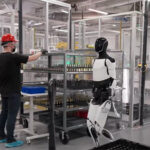AI is changing healthcare, from virtual monitoring to robotic assistants. But as intelligent systems begin to handle critical tasks, one truth becomes clear. Automation alone is not enough. The challenge is not just building AI; it is making sure it works safely, in real time, and at scale.
At iMerit, we work at the intersection of clinical expertise and machine intelligence. Our teleoperations teams provide the real-world support that healthcare AI systems need to succeed in dynamic, high-stakes environments.
Here are the key challenges we see across the industry, and how iMerit helps solve them.
Escalating Critical Events in Real Time with Healthcare Tele-operations
In elder care and hospital settings, seconds matter. A fall, sudden unresponsiveness, or distress event must be identified and escalated without delay. But AI models, even the best-trained ones, can struggle to consistently distinguish between normal motion and emergencies, especially in visually complex or low-light settings.
iMerit addresses this gap by embedding trained expert reviewers into the escalation loop. Our teams work 24×7 across global time zones, using clinically informed workflows to review, validate, and escalate alerts in real time. Each reviewer is equipped with protocols tailored to specific client requirements, ensuring that high-risk events are not just detected but acted upon appropriately.
This hybrid approach improves both safety and speed, reducing false positives while ensuring rapid intervention when real risk is detected.
Interpreting Complex and Subtle Human Behaviors
Behavioral cues in patients, such as restlessness, prolonged stillness, or erratic movement, often carry clinical significance. However, these signals are subtle, highly contextual, and easily misclassified by AI alone. For example, distinguishing between restful sleep and unresponsiveness requires more than motion data. It requires clinical judgment.
iMerit brings that judgment into the loop. Our teams of medically trained annotators label nuanced behaviors using structured taxonomies built specifically for healthcare use cases. Whether using client-specified platforms or our proprietary Ango Hub, we combine video and sensor data to understand context and intent behind each action, flagging deviations from baseline behavior that may signal distress or deterioration.
This level of precision enables developers to train AI systems that don’t just detect movement, but understand what it means.
Scaling from Pilot to Production Without Loss of Accuracy
Many healthcare AI tools show strong results in small pilots but face challenges when scaling. As systems expand across hospitals, regions, and patient populations, they must maintain accuracy, consistency, and compliance with strict regulations. That is where many teams hit bottlenecks.

iMerit helps remove those barriers by offering scalable teleoperations support tailored to each deployment stage. From pilot data labeling to full-scale live monitoring, our flexible infrastructure adjusts to meet your growth needs. Integrated quality assurance, tiered review processes, and compliance with HIPAA, SOC 2, and ISO 27001 ensure accuracy and data security at every scale.
We help AI systems maintain clinical performance as they grow, without compromising speed or safety.
Turning Raw Video and Sensor Data into Actionable Insights
AI systems are only as strong as the data they are trained on. But healthcare environments produce messy, unstructured data from video feeds to biosensor streams that cannot be used out of the box. Without well-organized annotations, it becomes difficult to build models that deliver meaningful outcomes.
iMerit specializes in transforming raw data into rich, structured datasets ready for model training and validation. Our teams label clinical behaviors, environmental context, and device interactions with precision and consistency. We also create event timelines, escalation markers, and custom tags based on client workflows to ensure the data aligns with clinical logic.
As a result, AI developers get cleaner datasets, faster iterations, and stronger model outcomes through our expert medical data annotation processes and specialized medical data labeling teams.
Why Human-in-the-Loop Is Not Optional in Clinical AI
In healthcare, trust is earned through accuracy, context, and care. AI must reflect human priorities, especially when decisions affect real patients. That is why human-in-the-loop systems are not just helpful; they are essential.
At iMerit, we bring together data expertise and medical insight to build custom medical data labeling teams that adapt to your goals and support responsible AI development. Whether the goal is real-time patient monitoring, robotic assistance, or ambient intelligence, we ensure every system is backed by the human understanding it needs to perform safely in the real world.
Let’s Build AI That Protects
Learn more about our tele-operations solutions here.
Schedule a Demo or Contact Us to explore how iMerit can support your healthcare teleoperations initiatives.

























